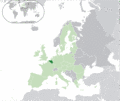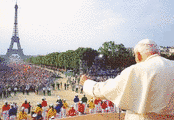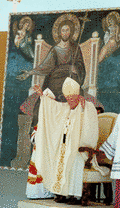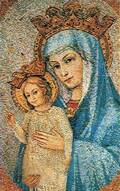BELGIUM - LA BELGIQUE - BELGIË
The Blessed Virgin Mary appeared in Belgium in 1933. Known as the 'apparitions of the Vierge des Pauvres', there is now a Shrine in Banneux.
Pope St John Paul II was a pilgrim to Belgium in 1985 & 1995.
St Paul VI beatified & St John Paul canonized St Mutien-Marie Wiaux FSC. Benedict XVI gave a catechesis on the Belgium Saint Juliana of Cornillon.
Here below are responses to Totus2us podcasts given by Belgians
- merci beaucoup à vous tous ♥
To download the free mp3 audio recordings individually, right/double click on the play button - Pour télécharger les enregistrements audio mp3 libre individuellement, droit / double-cliquer sur le bouton de lecture.
Prières en français sur Totus2us
Le Saint Rosaire avec Soeur Hyacinthe Defos du Rau OP ![]()
Le Chapelet et la Neuvaine à la Miséricorde Divine ![]()
Chemin de Croix avec Cardinal Joseph Ratzinger (Benoît XVI) ![]()
"I found in the Virgin Mary a huge strength to take me on my path to life.
Je prie très souvent la Sainte Vierge. Elle a un rôle très important dans ma vie. Je l'admire; je crois que c'est l'unique femme au monde que l'on peut admirer comme ça avec tout ce qu'elle a porté dans sa vie, toutes ses souffrances, mais aussi toutes ses joies."
"To me Our Lady is my mother and I turn to her for comfort and when I think about Our Lady I feel at peace and I know that she's going to sort me out."
"It’s of course the Blessed Virgin Mary who is our real, our true Mother. It's through her that God came amongst us and remains always amongst us. There are so many sufferings in the world today - Jesus is really crucified again, he is on the Cross. But just next to the cross is his mother and her head touches the holy side of Jesus, his heart. During all those terrible hours on the cross she's there, like at Bethlehem. She has her face on the heart of her little one. And when Jesus cries 'My God, my God, why have you abandoned me', Mary is saying to him, 'No, my little one, the Father is not abandoning you because your mother is not abandoning you.' And at that moment Mary is the sacrament, the visible sign, of the invisible presence of the Father. It's like as if the Father was putting Himself a bit aside in the feelings of Jesus in order that all his feelings be with his mother, like at Bethlehem. And it's Mary who gives her little one to his Father, who brings back Jesus to his Father. That is why after saying 'My God, my God' (and not 'Father, Father'), he says again 'Father, into your hands' because he has just said the word 'Mother', and in saying the word 'Mother' he receives again his Father."
Père Daniel-Ange is the founder of Jeunesse-Lumière, a school of prayer & evangelization.
"Mary for me is first of all a mother, I can entrust myself to her, and she’s someone who is always, always with me, always.
Dans la Vierge Marie, c’est ma mere. .. Quand je prends mon chaplet, eh bien, c'est comme si je prenais sa main. En prenant sa main, je sais que c'est elle qui me guide vers Jesus et c'est le chemin le plus sur pour me guider vers Jesus."
Father Fabien speaks about his vocation on Man for Others ![]()
"Little bit by little bit during these days at World Youth Day Paris I started to be struck by something. I saw that ‘how come all these people can be in this joy? And how come this old man, John Paul II, can attract so many young people? There is no one else in the world who has such a big influence like this.' And I thought maybe there is something more and maybe God really does exist. It was the beginning of a little openness in my heart. And then I went back home and a few weeks after a good friend proposed to me to go on holidays… We went to Majorca and it was really a very mundane place, where there is only discos, restaurants, beach, and our programme was just to follow the discos, restaurants, beach. What struck me during this time was the contrast between what I lived just 2 weeks before in Paris, a really deep joy, a profound joy, and after something very superficial in this life. After a few days I was alone (my friend had gone to do something) and I felt a big emptiness in me and I said 'How is it possible that I am so sad? This way of life, I thought it was happiness, just to go to restaurants ..' and the contrast of what I was living just before and what I was living now made me feel a very big emptiness in me and I said 'Maybe I should go back to God.' There was like a question in me, it was not an answer but an openness in my heart. 'But if everything I received in my childhood was true, and if maybe God really exists and if He can really fulfil me' I said to myself 'then I should leave everything and I should become a priest.'"
Father Fabien Lambert is a priest with the Emmanuel Community.
Father Filip Hacour chose Blessed John Paul II as his Man for Others
"At World Youth Day 2000 Pope John Paul II talked very personally about his own priesthood ...with so much zeal that everyone listened very attentively .. And then he said "Dear young men, do not fear to choose the way of priesthood; the world needs you, all people need you; do not fear." And then he said with so much strength and confidence these words: "With God and grace it is possible" and then he paused and in the whole of St Peter's Square there was a deep silence, a holy silence of listening. And then again this old Pope, affected by Parkinsons, said with a loud voice, 'With God and grace, it is possible." At that moment I was touched so deeply in my soul and in my heart. Never had a person touched me so much by a word. All the obstacles I had made in the years before, all the reasons I thought I had found for not becoming a priest, vanished at that moment. I understood in the deepest of that moment in my heart "Yes, it is clear. I have to become a priest. Of course, I have to become a priest. If this old sick Pope says this with so much strength then it must be true. It is possible with God and grace."
"My devotion to Our Lady stems really back to my early childhood, to my family life; my mother had a great devotion to Our Lady. I have found in my life that at all times but particularly at times of difficulty or crisis, Our Lady is an excellent person to turn to. Also she is a great model of charity, love, and of faith; that for me comes more strongly as time goes by. I am also conscious of the Latin quotation: To Jesus through Mary."
"Mary is above all our mother; the mother of all men by virtue of being the mother of God incarnate, bequeathed to us by her son at his death. She is the model of feminity in a world that has lost the sense of what it means to be a woman; she is the model of purity, of maternal love."
"15th August is a feast day [the Assumption] and there's a great party in Liège.
Le 15 août [l'Assomption], c'est une grande fête en Belgique."
"La Vierge Marie me fait penser à toute mon enfance parce que ma maman était très croyante."
"Our Lady is wonderful and she’s Jesus’s mother and she’s very kind."
"Mother Mary makes me think about Liège because she protects our city and she brought us light.
La Vierge Marie me fait penser à notre ville parce qu’elle la protège et elle la porte la lumière."
Si vous voudriez donner votre quelque chose de Marie,
s'il vous plaît contacter l'équipe Totus2us
- ainsi que vous apporter la joie (nous l'espérons)
vous seriez vraiment aider Totus2us ♥
Totus tuus ego sum et omnia mea tua sunt.
Accipio te in mea omnia. Praebe mihi cor tuum, Maria. - St Louis de Montfort
Bienheureux Jean-Paul II a pris sa devise Totus Tuus de cette citation.
"Je suis totalement vôtre et tout ce que j'ai est à toi.
Je vous accepter pour mon tout. Ô Marie, donne-moi ton cœur.”
Pope John Paul II's reflection on his 1995 pilgrimage to Belgium
General Audience, Wednesday 7 June 1995 - in Italian & Spanish
Lo Spirito Santo fonte della santità dell’uomo e incessante artefice della nostra santificazione
"1. La domenica di Pentecoste mi è stato dato di visitare ancora una volta il Belgio, nazione e Chiesa a cui sono particolarmente legato sin dai tempi dei miei studi a Roma, quando ero ospite del Collegio Belga. Questa volta, scopo della mia breve visita è stata la beatificazione di P. Damiano De Veuster, missionario della Congregazione dei Sacri Cuori di Gesù e Maria, che diede la vita servendo i lebbrosi nell’isola di Molokaî, situata nell’Arcipelago delle Hawaii.
Il Concilio Vaticano II, nella Costituzione sulla Chiesa, dedica un apposito capitolo alla vocazione universale alla santità. Conferma di tale vocazione sono i santi e i beati che la Chiesa eleva agli altari, additando in essi modelli di vita evangelica, segnati dall’eroicità delle virtù. Due settimane fa ho avuto la gioia di canonizzare a Olomouc in Moravia santa Zdislava e san Jan Sarkander. Domenica scorsa è stata la volta di P. Damiano De Veuster, quasi a proseguire una medesima testimonianza di santità. Il fatto poi che questa beatificazione sia avvenuta in coincidenza con la solennità di Pentecoste conferisce all’evento una particolare eloquenza. Lo Spirito Santo è infatti la Persona della Santissima Trinità alla quale è appropriata in modo particolare la santità di Dio. Lo Spirito Santo è, in conseguenza, fonte della santità dell’uomo e l’incessante artefice della nostra santificazione.
Nel cenacolo, dopo l’Ascensione del Signore al cielo, la Santissima Vergine Maria e gli Apostoli restarono in preghiera in attesa dello Spirito Santo: questa preghiera è, in qualche modo, costantemente esaudita nella storia della Chiesa. Lo testimoniano le canonizzazioni e le beatificazioni, compresa quella di P. Damiano vissuto dal 1840 al 1889 ed il cui esempio ha attirato, tra gli altri, anche il gesuita polacco P. Giovanni Beyzym, apostolo dei lebbrosi nel Madagascar. Il processo di beatificazione di P. Beyzym è in corso.
Giugno mese dedicato al Sacro Cuore di Gesù
2. Giugno è il mese dedicato al Sacro Cuore di Gesù. Ciò è stato significativamente sottolineato dal fatto che la beatificazione di P. Damiano si è svolta a Brussel, sullo sfondo della Basilica del Sacro Cuore, a Koekelberg. Essa, nonostante la pioggia, è stata seguita con vivo raccoglimento ed ha visto stringersi attorno all’altare fedeli provenienti da varie città e nazioni. Una delegazione era venuta dall’isola di Molokaî per ricevere la reliquia del loro missionario e portarla in patria. La Chiesa belga costruì la Basilica del Sacro Cuore dopo la fine della prima guerra mondiale, che aveva provocato molte vittime. Come non pensare al grande cimitero di guerra ad Ypres presso Gand, dove durante il mio precedente pellegrinaggio, dieci anni fa, si svolse l’incontro con i giovani?
Un’ardente preghiera per la pace nel continente europeo e nel mondo intero
Il ricordo della prima e soprattutto della seconda guerra mondiale, all’indomani delle celebrazioni del 50 della sua fine in Europa, si è unito durante la visita ad un’ardente preghiera per la pace nel continente europeo e nel mondo intero. I Belgi sono molto presenti nella edificazione della pace. Vale la pena qui di ricordare che l’attuale Arcivescovo di Mechelen-Brussel, il Cardinale G. Danneels, è presidente dell’organizzazione mondiale Pax Christi. I suoi predecessori hanno svolto ruoli significativi nella storia della nazione in occasione della prima e della seconda guerra mondiale: durante la prima, guidava la diocesi il Cardinale D. Mercier, e durante la seconda, il Cardinale J. Van Roey, la cui eredità fu poi rilevata dal Cardinale L. J. Suenens, oggi ormai novantenne. Il rito di beatificazione, svoltosi presso la Basilica del Sacro Cuore, ha permesso di ricollegarci a queste grandi figure ecclesiali e alla testimonianza da essi resa a Cristo.
Nella Cattedrale il ringraziamento per la beatificazione di P. Damiano
L’incontro pomeridiano, tenutosi nella cattedrale dell’Arcidiocesi di Mechelen-Brussel, è stato come il ringraziamento per la beatificazione, espresso dalle Congregazioni dei Sacri Cuori di Gesù e Maria, presenti in vari Paesi del mondo. L’augurio è che la beatificazione di P. Damiano contribuisca a intensificare la loro attività missionaria. Ha preso parte al rito l’intero Episcopato Belga, tra i cui meriti nella vita della Chiesa vanno menzionati quelli in campo ecumenico, nel periodo preconciliare e dopo il Concilio Vaticano II.
Un grazie cordiale all’Episcopato e alla Chiesa che è in Belgio
3. Per concludere, desidero esprimere un grazie cordiale all’Episcopato e alla Chiesa che è in Belgio per essere stato invitato a questa visita. Ringrazio pure le autorità, i responsabili e i pubblici amministratori che si sono adoperati in ogni modo per il suo svolgimento positivo. Ringrazio soprattutto per la preparazione pastorale della visita, garanzia di abbondanti frutti spirituali nella vita dei fedeli.
Questo viaggio apostolico avrebbe dovuto aver luogo lo scorso anno, ma a causa del noto incidente occorsomi è stato rimandato. Avrebbe dovuto essere più articolato ed ampio, con più incontri e tappe. Tra queste, l’incontro con i giovani, che non manca mai in ogni mio pellegrinaggio apostolico, perché la gioventù è il futuro e la speranza della Chiesa e della società.
Vorrei profittare di quest’occasione per salutare tutti coloro che avevo in animo di incontrare.
Il Re Baldovino: un grande custode dei diritti della coscienza umana
Mi è difficile non menzionare qui la Dinastia regnante. Ringrazio il Re Alberto e la Consorte per la gentile accoglienza. Il Belgio è una monarchia costituzionale e i Reali belgi si sono iscritti in modo indelebile nella storia della loro nazione, ed anche in quella dell’Europa. Penso ai monarchi del periodo della prima e della seconda guerra mondiale. In modo particolare, penso al re Baldovino recentemente scomparso, che ebbi la fortuna di incontrare alcune volte, non soltanto durante la mia precedente visita in Belgio, ma anche a Roma. Il suo ricordo è impresso nella memoria dei connazionali e di tutti noi. È stato un grande custode dei diritti della coscienza umana, pronto a difendere i comandamenti divini, e specialmente il V comandamento: “Non uccidere!”, in particolar modo per quanto riguarda la tutela della vita dei bimbi non ancora nati.
La sua eredità spirituale, custodita con premura dalla vedova, la regina Fabiola, costituisce un tesoro comune per la nazione e per la Chiesa. Quanto essa sia viva nei connazionali, lo testimonia la reazione commossa e corale provocata dal ricordo di lui in quanti hanno partecipato alla cerimonia di beatificazione di P. Damiano.
La mia visita in Belgio e soprattutto la Beatificazione di P. Damiano è divenuta una tappa importante nel cammino di preparazione all’inizio del Terzo Millennio. I santi infatti evidenziano più pienamente la presenza di Cristo nella storia dell’umanità. Grazie ad essi Cristo, “lo stesso ieri, oggi e sempre” (cf. Eb 13, 8) ci permette di varcare i confini del tempo, preparandoci in questo modo all’eternità che è la dimensione di Dio."
Pope St John Paul II's homily at Holy Mass with former students of the Pontifical Belgian College in Rome
Friday 31 March 1979 - also in French, Italian, Portuguese & Spanish
"Dear Friends,
The Eucharist we are celebrating together is the sign of particular unity with Christ, the one eternal Priest, who "entered once for all into the Holy Place, taking... his own blood" (Heb 9:12).
The same Christ is always present in the Church "to the close of the age" (Mt 28:20). He dwells in her, gathering the people of God round the table of the Word and of the Eucharist. He dwells in her through our priestly service.
When we find ourselves around the altar in this way today, in this communion that we formed formerly at the Belgian College in Rome, our hearts are then filled with gratitude for the gift of the priestly vocation, because he has chosen us so that we may go and bear fruit (Jn 15: 16), because, entrusting his mysteries to us, he has entrusted to us men who have "redemption through his blood" (Eph 1:7). Looking at all that with the eyes of faith, we feel our worthlessness and we are always ready to repeat: "We are unworthy servants" (Lk 17:10.) We always feel, too, the greatness of God and we thank God for this gift. "O give thanks to the Lord, for he is good" (Ps 105, 1).
Today, we wish to address this gratitude to one another. The Lord wishes us to know how to be grateful to men, to look at our life from the point of view of the gifts received through men, our brothers. Thus, I would like today, with you, to look back on those years which gathered us within the walls of the old Belgian College, situated at 26 Via del Quirinale, in the neighbourhood of St Andrew's Church where St. Stanislaus Kostka, the Patron Saint of youth, died and rests.
Some thirty years separate us from that time. One might yield to the laws of time which bring us, among other things, to forgetfulness. But the voice of the heart is stronger, which asks us to keep things in our memory and think of them again with gratitude. Today we thank Christ who bestowed on us the grace of being together, in this important period of our lives, when we were still in the first years of our priesthood or preparing for it. "Ecce quam bonum et quam jucundum habitare fratres in unum": "Behold, how good and pleasant it is when brothers dwell in unity!" (Ps 133, 1).
We thank God for having let us be brothers for one another, and our gratitude is also reciprocal among us. He let us live this brotherhood which unites men coming from different families, different nations, different continents, for that was how he gathered us then. We say: thanks for what each one was for the others at that time and for what everyone was for everyone. Thanks for the way we shared with others our qualities of intelligence, character and heart. Thanks for the place that the studies then in progress had, in this mutual exchange, as well as the apostolic and pastoral experiences in which each one of us was already engaged. Thanks for what sacred Rome was for us, as we learned to know it systematically as the capital of antiquity and the capital of Christendom. Thanks for what was the experience of Europe, of the world, of each of our countries, which were then picking themselves up after the sufferings of the second world war.
Let us think finally of what our Superiors were for us: our revered Rector, Cardinal de Furstenberg, who is present in our midst today; and also our Bishops who came to see us, who visited us at the College, as well as other ecclesiastics, the apostles of their time, such as Father Cardijn, not to mention the learned professors, the preachers of retreats, the directors of conscience: what have they been for us?
We want to speak of all that, in the first place, to Christ himself, beginning with this concelebration, this liturgy. And this concelebration permits us also to express ourselves to one another. We also wish to renew this spirit that we received through the "laying on of hands" (cf. 2 Tm 1:6), and this union of hearts, the secret of which the Lord himself knows. Amen!"





